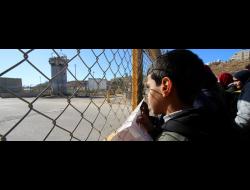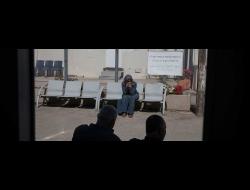Update: Ahmad Qattamesh was released on 26 Dec. 2013
 Ahmad Qattamesh, 61, is currently one of the longest-held administrative detainees in Israel. He was held in administrative detention for approximately four and a half years from 1993 to 1998. In May 2011, the military detained him once more again under an administrative order, and he has been in custody ever since. The order for his detention will expire on 28 December 2013.
Ahmad Qattamesh, 61, is currently one of the longest-held administrative detainees in Israel. He was held in administrative detention for approximately four and a half years from 1993 to 1998. In May 2011, the military detained him once more again under an administrative order, and he has been in custody ever since. The order for his detention will expire on 28 December 2013.
In 1994, B’Tselem first addressed the detention of Ahmad Qattamesh, in a chapter on administrative detention in its report Human Rights Violations: 1992-1993. In 1997, B’Tselem returned once more to the Qattamesh case in its report Prisoners of Peace, writing as follows:
Ahmad Qattamesh - Forty-three months in administrative detention
Ahmad Qattamesh, a 45-year old writer from al-Bireh is married and has a seven-year old daughter. He was arrested in September 1992 and charged in the Hebron military court with assistance to an illegal organization, possession of illegal material, and falsification of an identity card. Because he had been held for a year before his trial began, the military judge ordered his release. The military court of appeals upheld this decision. In October 1993, however, before he could be released, a six-month administrative detention order was issued for him. Both the military judge and the High Court of Justice upheld this decision. In the ruling, Chief Supreme Court Justice Aharon Barak wrote:
"Administrative detention is not a substitute for detention until the end of [judicial] proceedings. When a court decides to release a defendant until the end of proceedings against him, the military commander is not authorized - on the basis of the same information - to detain the defendant until the conclusion of proceedings ... However, there is no reason that the defendant ... cannot be held in administrative detention, as long as the evidence supporting the administrative detention is not the same as the evidence supporting detention for the duration of the legal proceedings. Indeed, in a democratic regime, bringing criminal charges is preferable to administrative detention. However, when there is prima facie evidence against a suspect, part of which can be revealed (and used in a criminal trial) and part of which is classified (and therefore cannot be used in a criminal trial), it is best to prosecute on the basis of the non-classified information ... In this situation, if the suspect is acquitted of the criminal charges, there is nothing to prevent good faith use of the classified information for administrative detention proceedings... If this is the case regarding acquittal of criminal charges, then it is even more relevant with regard to administrative detention prior to the conclusion of the criminal trial."
The military arrested Qattamesh once more on 24 April 2011 and kept him in custody until 3 May 2011, on which date he entered administrative detention. Since then, the administrative detention order has been renewed six times. Adv. Jawad Boulous applied to the High Court of Justice four times on behalf of Qattamesh regarding the decisions to keep him in administrative detention, but all four petitions were rejected. At present, he is being held at Megiddo Prison. On 3 October 2013, in its latest decision to date, the military court for administrative matters approved a four-month administrative detention order for Qattamesh, beginning on 28 August 2013. That said, the judge ruled that Qattamesh’s administrative detention would end when the order expires on 28 December 2013, “unless there is material and significant intelligence and/or regional change which dictate extending this time period”.
The military law that applies in the West Bank grants the military commander there the authority to hold a person in administrative detention for a maximum period of six months, yet also authorizes him to repeatedly extend the detention as long as he believes that there are “reasonable grounds for assuming that public or regional security necessitate holding a particular person in detention”. This procedure is ostensibly subject to judicial review, as issuing the order and its renewal requires authorization by a military judge. In addition, there is a military appellate court. However, deliberations in both courts are held in camera, with information withheld even from the detainee and his legal counsel. The judge may deviate from evidentiary law and “accept evidence in the absence of the detainee or his representative or without disclosing it to them”, if convinced that disclosing the evidence may “compromise the security of the area or public security”.
On 31 October 2013, there were 140 Palestinians being held in Israeli administrative detention. Among them were Ahmad Qattamesh who has been in detention for over two and a half years, another person who has been held for over three years, and another for over two years. Nine other persons who are currently being held in administrative detention have been in custody for more than a year and a half.
Under international law, administrative detention is allowed under certain circumstances. However, because of the serious harm to due process inherent in this measure and the obvious danger of its abuse, international law has imposed rigid restrictions on its application. According to international law, administrative detention can be used only in the most exceptional cases and only as a last resort to prevent danger that cannot be averted by less damaging means.
Israel's use of administrative detention blatantly violates the restrictions of international law. Israel carries it out in a highly classified manner that denies detainees the possibility of mounting a proper defense. Moreover, the detention has no upper time limit. Over the years, Israel has placed thousands of Palestinians in administrative detention for prolonged periods of time, without trying them, without informing them of the charges against them, and without allowing them or their counsel to examine the evidence. In this way, the military judicial system ignores the right to freedom and due process, the right of defendants to state their case, and the presumption of innocence, all of which are protections clearly enshrined in both Israeli and international law.
B’Tselem calls upon the government of Israel to release immediately Qattamesh and all other administrative detainees. Alternatively, if there is evidence against any administrative detainee, Israel must accord him due process and try him for the alleged offenses.


